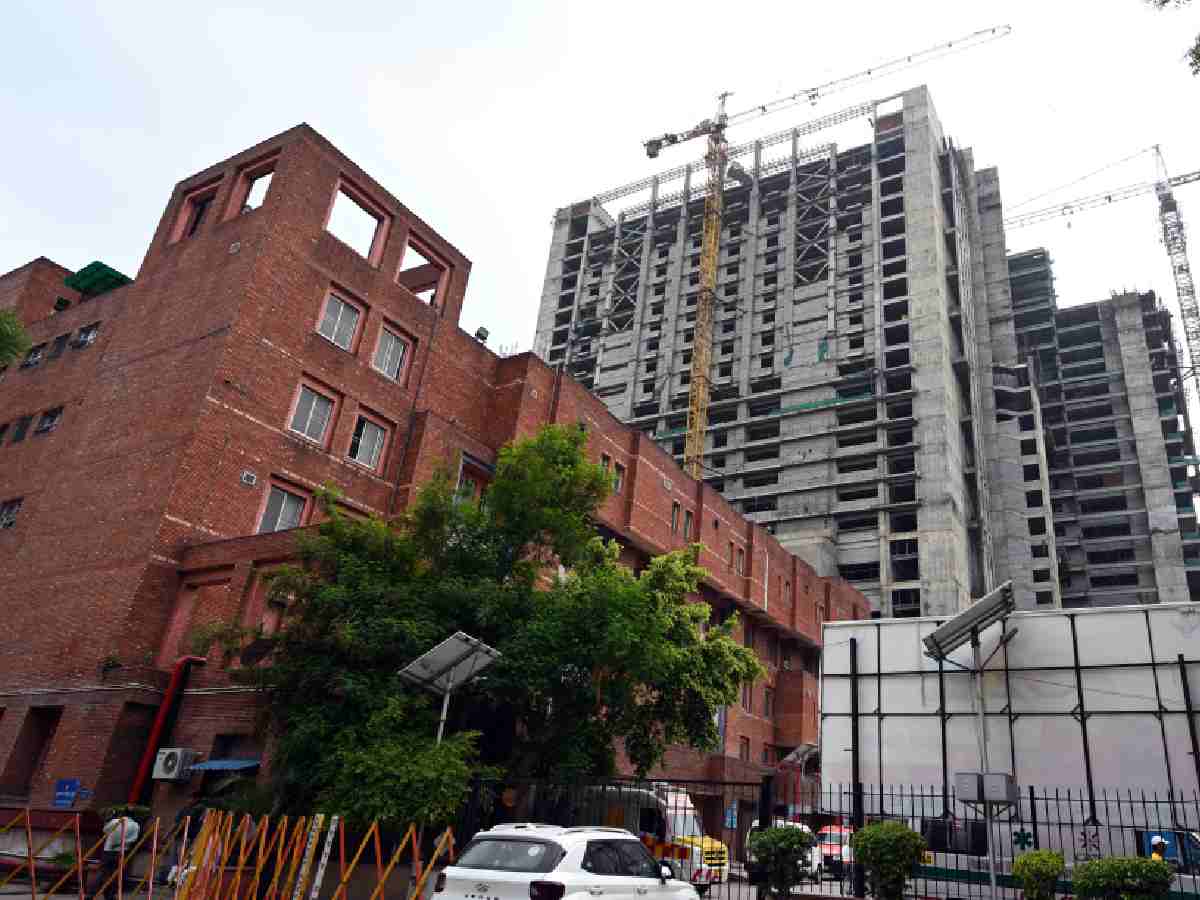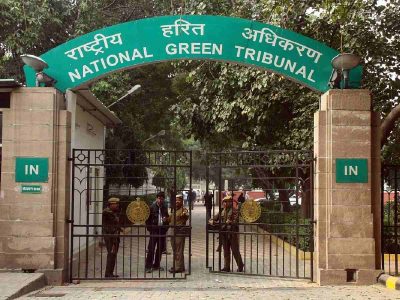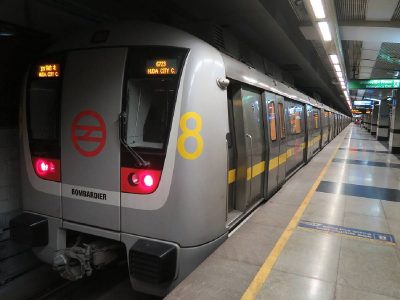Delhi: Doctors in the Delhi government hospitals have been struggling with deplorable working conditions, inadequate basic amenities and security concerns for a long period without any resolution.
The number of attacks on doctors by disgruntled relatives has escalated to an alarming rate. Recently, Guru Teg Bahadur (GTB) Hospital, one of the largest government hospitals in the East district, experienced a significant security breach which led to the death of a patient in a case of mistaken identity.
Incidents included a patient being shot and a doctor being brutally assaulted, prompting medical staff, nurses to stage a sit-in against the lack of security measures. This series of incidents has raised concerns about the deteriorating situation and the need for urgent action.
Major Security Lapse
As the Patriot visited government hospitals across the city, it came to notice that the GTB hospital currently lacks metal detectors at the entry points. On record, however, there are only 290 guards deployed at the hospital, though the requirement is 500. Security guards do not perform any kind of security checks while allowing an individual to enter the premises. The work of the security guards is just guiding the patients and checking the entry pass in which they also lack, doctors alleged.
Also read: Delhi GTB Hospital Shooting: Actual target had asked for protection, says brother of victim
Apart from GTB hospital, Patriot visited several facilities noticing significant lapses.
At Lok Nayak Hospital, the absence of door frame metal detectors at the emergency department exposed the hospital to security breaches. Inconsistent security checks were observed, with regular visitors often bypassing proper screening.
Although the administration insisted all entrances had metal detectors and sufficient security personnel, observations contradicted these claims. The hospital employs around 450 guards, 50 supervisors, and has 900 CCTV cameras, but gaps in security practices remain evident.
Similarly, Ram Manohar Lohia (RML) Hospital lacked adequate security measures, particularly metal detectors. Security staff focussed on directing visitors rather than conducting checks. The administration claimed that emergency care areas were staffed with personnel using handheld metal detectors, but this did not align with on-site observations.
Safdarjung Hospital, the largest central government healthcare facility in the city, also showed security gaps. While equipped with metal detectors and CCTV cameras, security personnel did not consistently screen entrants effectively. A patient’s attendant expressed concern over the lack of security screenings during their 48-hour stay.
The hospital spokesperson asserted that sufficient measures were in place, including 1,198 guards and mandatory frisking, but these measures appeared adequately implemented.
Patriot reached out to LNJP, RML, and GTB hospital for their response, However, they refused to comment on the matter.
Working Conditions
Besides the lack of security, doctors at government hospitals are working under challenging conditions, such as lack of staff, infrastructure, medical supplies and equipment.
Lok Nayak Hospital
The LNJP hospital currently has over 1,597 commissioned beds in all the medical and surgical specialties. However, the daily admissions at the hospital stand at 6,000-7,000. Each doctor has to handle approximately 150 patients a day as nearly 200-300 patients are present at the OPD on a regular basis.
Dr Aviral Thakur, RDA member, LNJP Hospital, said, “At Lok Nayak Hospital, we sometimes face phases where certain equipment and drugs are in short supply. This issue is not unique to our institution and can be attributed to various factors such as supply chain disruptions and increased demand.”
“However, it is essential to note that these shortages are usually temporary and are managed through alternative arrangements to ensure patient care is not compromised. Under the leadership of our MD, Dr Suresh Kumar, we continuously work with the hospital administration and relevant authorities to mitigate these shortages and streamline the procurement process for medical supplies and equipment,” he said.
Also read: Delhi: GTB doctors strike call off strike after assurances
“Additionally, the shortage of senior residents in many hospitals, including ours, leads to a higher patient load per doctor. This situation often necessitates our doctors to extend their shifts to ensure all patients receive the necessary care. While our medical staff is dedicated and committed to providing the best possible service, this strain can lead to burnout and impact the overall quality of care. Dr Suresh Kumar has been instrumental in addressing this issue, as we are in constant dialogue with the administration to find immediate solutions and balance the workload by seeking more senior residents,” Dr Thakur said.
“The infrastructure at Lok Nayak Hospital, like many other govern ment hospitals, is struggling to keep pace with the growing patient demand. We face challenges related to space, modern facilities, and advanced medical technology. These limitations affect our ability to deliver efficient healthcare services,” Dr Thakur added.
GTB hospital
The GTB hospital has been in the headlines for the past two weeks due to the incidents of firing and doctors getting attacked by a patient’s relatives. It has a 1,700-bed capacity, while the daily admission of patients is nearly 7,000-8,000.
The patients were seen sharing beds in the ward depicting a hopeless situation. The hospital is understaffed as underlined by a senior doctor stating that two doctors handle nearly 300-400 patients on a daily basis at the OPD.
Dr Nitesh Kumar, President of the Resident Doctors Association at Guru Teg Bahadur (GTB) Hospital in East Delhi, said, “The life of a resident is very tough in the government hospital. The quality of food at the hospital and college mess is poor, and the conditions of the Doctors Duty Room (DDR) and washrooms are terrible. Air conditioners and water coolers are non-functional, and despite raising complaints with the hospital administration, issues remain unresolved. Centralised ACs are not working, and during Delhi’s water scarcity, the situation worsens due to lack of proper ventilation.”
“There is a significant lack of drug supplies, and in some cases, even emergency drugs are not available, forcing us to ask patients to bring their own. The gynaecology emergency OT has walls covered in fungus, reflecting poor working conditions. Doctors’ working hours are unlimited; sometimes PG residents work continuously for 50 hours to save patients. The DDR conditions should be improved, as the working conditions for doctors in Delhi government hospitals are very pathetic,” Dr Kumar said.
“In one day, we handle 7,000-8,000 patient admissions despite having only 1,500 beds. We have to place around 200-300 patients in one room, and there is a lack of doctors. Two doctors deal with 300 patients daily. Emergency areas like ICUs and gynaecology casualties need appropriate security, especially given the two major incidents in the past two weeks,” Dr Kumar informed.
“The GTB Junior Resident Doctor (JRD) hostel should be verified, as its condition is not liveable. Police patrolling should be implemented in the hospital to ensure the safety of students and doctors. An emergency exit system should be in place for doctors to escape if the situation gets out of control,” he said.
“OT technicians face major issues. When there should be two OTs, there is only one OT operational. The file for hiring more staff has been long pending, and the same condition applies to the nursing staff. We often have to ask patients’ relatives in the ward to take care of the patients,” Dr Kumar added.
The Delhi Government refused to respond to the allegations.
Doctors Speak
Dr RishiRaj Sinha, National General Secretary, Federation of All India Medical Association (FAIMA) said, “Doctors in government hospitals often work under challenging conditions, characterised by long hours, high patient loads, and sometimes limited resources. They frequently face overcrowded facilities and insufficient staff, which can lead to burnout and stress.”
“Despite these difficulties, many doctors remain dedicated to providing quality care to their patients, often going above and beyond their duties. Unfortunately, there have been increasing incidents of violence against resident doctors, by patients’ families. These attacks, combined with the high-stress environment, have led to a worrying rise in suicides among medical professionals,” said Dr Sinha.
“The government should consider this a very serious issue and definitely consider the implementation of the Central Protection Act to ensure the safety of resident doctors on duty. This act aims to safeguard healthcare workers by enforcing strict penalties for violence against medical staff, ensuring their security and well-being, and thereby improving the overall healthcare delivery in government hospitals,” added Dr Sinha.
Delhi government’s response
In response to recent incidents of violence at health facilities, the Delhi government has decided to deploy two armed guards and install metal detectors at the emergency entrance of hospitals.
Health Minister Saurabh Bharadwaj announced these measures on July 15 following a meeting with members of FAIMA.
Met Federation of All India Medical Association (FAIMA) delegation lead by the National Chairman, accompanied by National General Secretary, Chief Advisor to discuss the recent incidents of voilence in government Hospitals.
Following decisions have been taken :
1)… pic.twitter.com/w4pJOnKwUc
— Saurabh Bharadwaj (@Saurabh_MLAgk) July 15, 2024
“Met Federation of All India Medical Association (FAIMA) delegation led by the National Chairman, accompanied by National General Secretary, Chief Advisor to discuss the recent incidents of violence in Government Hospitals. The following decisions have been taken: 1) Installation of metal detectors at the emergency entries of hospitals. 2) Deployment of two armed guards at the emergency entries of major hospitals,” Bharadwaj said in a post on X.
Experts committee report
Delhi has 39 hospitals managed by the state, eight operated by autonomous bodies, 427 dispensaries, 546 neighbourhood clinics, 30 polyclinics, and eight medical colleges.
Despite this extensive network, a Supreme Court-constituted expert committee highlighted significant deficiencies in the city’s government hospitals.
The committee reported an inadequate number of quality operation theatres and pre- and postoperative facilities. Essential equipment, such as ultrasounds, CT/MRI scans, and anaesthesia machines, are often unavailable.
Additionally, there is a persistent shortage of medicines. Experts also noted the absence of a structured referral system within the government health sector. This lack of coordination leads to overcrowding in referral hospitals and sub-optimal patient care. They emphasised the need for a centralised control room and helpline to direct patients to the nearest appropriate healthcare facility, ensuring better emergency management.
Incidences at GTB hospital
GTB Hospital has been under scrutiny for multiple security lapses within its premises twice in the past month. Recently, on July 14, a patient in ward No. 24 was shot to death after an assailant, identified as Faiz, opened fire inside the ward, killing Riyazuddin.
According to the police, the shoot out claimed the life of an innocent person, as the assailants had arrived at the hospital to assassinate another unnamed person admitted to a different ward. Police officials disclosed that the firing started when Riyazuddin’s sister, Tarranum, was tending to him under the supervision of doctors.
Presently, the police have apprehended Faiz and his accomplice, Farhan; however, Faheem, the mastermind who is a resident of Loni, remains at large. Further investigations are underway.
On July 9, another incident unfolded where an entire family started thrashing doctors and other staff members. According to police officials, around 70 armed persons forcefully entered the campus and started attacking doctors, nurses, and other staff members while vandalising and damaging essential property inside the hospital. The incident occurred after a woman succumbed to surgery after giving birth to a child. Following the chaos, the Resident Doctors’ Association (RDA) filed an FIR with the GTB Enclave Police Station. GTB Hospital has been in the news frequently for such situations.
Earlier in 2021, the hospital came under scrutiny when a doctor was assaulted by a patient’s family following an argument over their entry into the emergency ward during the COVID pandemic. According to the complaint, the doctor was slapped by the wife of a COVID 19 patient.





